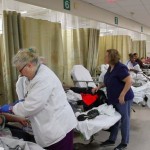Editor’s Note: This is the second story in a series examining the growing number of women in pharmacy leadership and ASHP’s work to support them.

Jill Bates, Pharm.D., M.S., BCOP
JILL BATES, PHARM.D., M.S., BCOP, did not begin her career as a pharmacist. This may come as a surprise to those who know her as Clinical Pharmacy Specialist in Hematology/Oncology and Residency Program Director for the PGY2 oncology residency at University of North Carolina (UNC) Healthcare System, where she’s been for eight years.
In her clinical role at UNC Health Care, Dr. Bates primarily cares for patients with lymphoma and myeloma, seeing them for symptom management, medication management, chemotherapy education, and other medication-related needs. When it comes to educating patients, however, Dr. Bates’ first career may have helped prepare her for a teaching role.
Challenges Along the Path to Pharmacy
Dr. Bates began her professional career as a high school science teacher in Texas. Although she loved teaching, the hours were long, and the pay was less than ideal. Dr. Bates decided to switch vocations after attending a healthcare career seminar but needed to return to school to complete a master’s degree for prerequisites. During that time, she attended a session on the changing roles of the pharmacist.
I never knew pharmacists worked with patients until I went to that session,” she recounted. “I liked that, as I really wanted to work directly with patients.” That, combined with the fact that her father, as manager of a Jewel-Osco Pharmacy in Illinois, had worked closely with pharmacists and always spoke highly of them, drove Dr. Bates’ choice to be a pharmacist. And that’s when the challenges began.
It wasn’t easy going back to school after being in the workforce for several years. Dr. Bates married prior to pharmacy school and found that the sudden loss of income was more challenging than she and her husband had anticipated. “The demands of training were difficult on my marriage,” she said. “I put having a family on hold to complete my training, and that led to some duress wondering about my future role as a mom.”
I see a direct connection between the pursuit of residencies and other advanced credentials and the advancement of pharmacy. Patients stand to benefit tremendously from pharmacists’ ability to provide higher-level care.
Dr. Bates graduated from pharmacy school and eventually had two children. Being a new practitioner while pregnant posed some daunting challenges. She developed gestational hypertension with both pregnancies, and preeclampsia led to hospitalization and bed rest during the second.
“The sheer chronic exhaustion that comes from the physical demands of all those changes in your body and working full time as well is something that many young professional women experience,” she said. Despite this, Dr. Bates was able to not only survive but thrive.
Of course, there was some help along the way. “I stand on the shoulders of giants… too many to list, honestly,” said Dr. Bates. “Blessings that I did not deserve happened mostly at the beginning of my career during my training. I continue to feel incredibly grateful.”
Dr. Bates believes in the “pay it forward” model and consistently looks for opportunities to support fellow pharmacists in their own career journeys. She is a member of ASHP’s Women in Pharmacy Leadership Steering Committee, the former chair of ASHP’s Section of Clinical Specialists and Scientists, and former vice chair and chair of the ASHP Council on Therapeutics. Dr. Bates is currently focusing on growing the residency program at UNC Health Care.
“I see a direct connection between the pursuit of residencies and other advanced credentials and the advancement of pharmacy,” she said. “Patients stand to benefit tremendously from pharmacists’ ability to provide higher-level care.”
A Perfect Balance of Patient Care and Scholarship
Dr. Bates’ interest in hematology/oncology arose even before she went to pharmacy school. As she researched the effects of polyamine analogs on transformed malignant cell cultures for her master’s degree, Dr. Bates became intrigued by oncology and has maintained that passion throughout pharmacy school and a residency, to her position today. “What makes my job worthwhile is that I am doing meaningful work,” she said. “I am making a difference in people’s lives.”

Specialties like oncology pharmacy offer a great avenue to showcase pharmacists’ patient-care expertise.
What Dr. Bates enjoys most about her position is the combination of relationships and scholarship. In addition to deep collegial relationships with coworkers, every year she develops relationships with pharmacy residents and students, medical oncology fellows, nurses, pharmacy technicians, and others. But Dr. Bates finds that the most rewarding aspect of being a pharmacist is getting to know her patients.
“I love learning their stories and working together to improve their health,” she said. “It is a privilege to be their pharmacist. I see true heroes every day.”
Dr. Bates’ passion for learning new information helps her to thrive in a difficult yet innovative workplace.
“The physicians I work with really push me to do things that I just never thought a pharmacist could do,” she said. “It provides me with the ability to practice at the top of my license. Many times, the only thing holding me back is my own fear.”
Words of Wisdom for Fellow Women Leaders
Dr. Bates is glad that ASHP is embarking on a journey to focus on the needs of women pharmacist leaders. “I feel that women experience an internal struggle with respect to leadership positions. For example, the fact that many leadership roles require more travel and time away from home can be difficult to manage,” she said.
Having faced the challenges she did over the course of her career has sparked a passion in Dr. Bates for the issue of women in pharmacy leadership.
“I strongly believe that when you encounter a problem, you should be a part of the solution,” she said, adding that she places a high priority on activities that grow women pharmacists’ ability to shine in practice.
What makes my job worthwhile is that I am doing meaningful work. I am making a difference in people’s lives.
“I have been so fortunate in terms of the large number of people who have helped me over the years that I feel it is my responsibility to offer my service to our profession,” she noted.
So what does Dr. Bates recommend for women rising in the profession?
“Maintain focused intensity,” she said. “It wasn’t until I became very honest with myself and clear on my passions/goals that I started to feel some harmony between my professional and personal life.” Dr. Bates suggests putting goals in writing, setting goals for all aspects of life (not just professional), and reevaluating them periodically. She also advises establishing habits that support a single-minded focus.
“For example,” she said, “I spend one hour a day early in the morning doing professional development work. Building habits makes it easier to get things done.”
Dr. Bates believes it’s important for women pharmacists to support each other; in particular, she recommends sponsoring other, younger female professionals who show potential. “I also think it’s important to be open about issues you face as a woman. Don’t hide the fact that you are a mom, wife, or any other variable that describes you as a woman. Talk about it publicly.”
And her advice for men?
“I think it is very important for women to always consider their male counterparts in these discussions,” said Dr. Bates. “The changing roles of women affect men, and it’s important to support them as we all adapt to a new norm. I believe that the changing demographics in pharmacy allows for new perspectives to be heard. And I think that it generally leads to better decision making and improved productivity. Having more women in pharmacy leadership ultimately benefits everyone—our profession, our healthcare organizations, and our patients.”
— By Ann W. Latner, JD








 If you want to contribute tutorials, news or other stuff please contact us. We pay 150 for each approved article.
If you want to contribute tutorials, news or other stuff please contact us. We pay 150 for each approved article. Consectetur adipisicing elit. Sed do eiusmod tempor incididunt ut labore.
Consectetur adipisicing elit. Sed do eiusmod tempor incididunt ut labore. This site uses valid HTML and CSS. All content Copyright © 2010 Newscast, Inc
This site uses valid HTML and CSS. All content Copyright © 2010 Newscast, Inc If you like what we do, please don't hestitate and subscribe to our
If you like what we do, please don't hestitate and subscribe to our